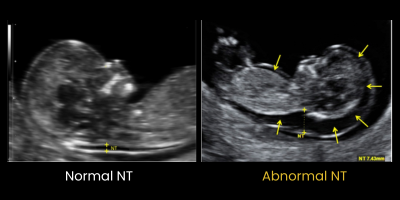Book an Ultrasound Scan
To book an First Trimester Screening Call us Now at 1800 120 51600
Learn More
The nuchal translucency (NT) measurement, nasal bone assessment, and Down syndrome screening are interrelated as part of first-trimester screening to assess the risk of chromosomal abnormalities, including Down syndrome (Trisomy 21). Here’s how they correlate:
By using these markers together, clinicians can provide a more accurate risk assessment for Down syndrome and other chromosomal conditions.
First Trimester Screening (FTS), typically conducted between 11 and 14 weeks of pregnancy, is a non-invasive test combining an ultrasound scan (e.g., Nuchal Translucency or NT Scan) and maternal blood tests. It assesses the risk of chromosomal abnormalities like Down syndrome, Edwards syndrome, and Patau syndrome, as well as some structural anomalies.
In India, where high birth rates and diverse healthcare access levels coexist, first-trimester screening plays a critical role in ensuring healthy pregnancies and informed decision-making.
High Prevalence of Genetic Disorders: Chromosomal abnormalities, especially Down syndrome (1 in 800–1,000 live births), are common in India, with over 23,000–29,000 cases annually. Screening helps identify pregnancies at risk early, reducing the likelihood of undiagnosed cases at birth.
Early Detection for Better Decision-Making: First Trimester Screening provides an opportunity for parents to make informed choices regarding advanced diagnostic tests (e.g., amniocentesis) or pregnancy management. Early intervention also helps families prepare emotionally and medically for any potential complications.
Impact of Maternal Age Trends: With increasing maternal age in urban areas, the risk of chromosomal abnormalities rises significantly. Screening becomes even more critical as women aged 35+ have a higher likelihood of giving birth to a baby with genetic disorders.
Prevention of Late-Stage Detection: Identifying risks in the first trimester reduces reliance on second-trimester tests, which, if positive, may lead to emotional distress and difficult decisions in the later stages of pregnancy.
Healthcare Challenges in India: In rural and underprivileged areas, access to advanced healthcare and diagnostic facilities is limited. Early screening allows timely referrals to tertiary care centres for necessary follow-ups.
Reducing Long-Term Medical and Emotional Burden: Conditions like Down syndrome often come with significant healthcare needs (e.g., surgeries for congenital heart defects) and require lifelong support. Early detection minimizes unanticipated medical and financial strain on families.
Explore Scans During the First Trimester:
Explore Scans During the Second Trimester:
Explore Scans During the Third Trimester:
If you are pregnant and looking for a reliable and trustworthy ultrasound centre, book your pregnancy scans at Petals Imaging. We are operational at three locations across Kolkata. Here’s why your scan experience at Petals Imaging will be the best in Kolkata: